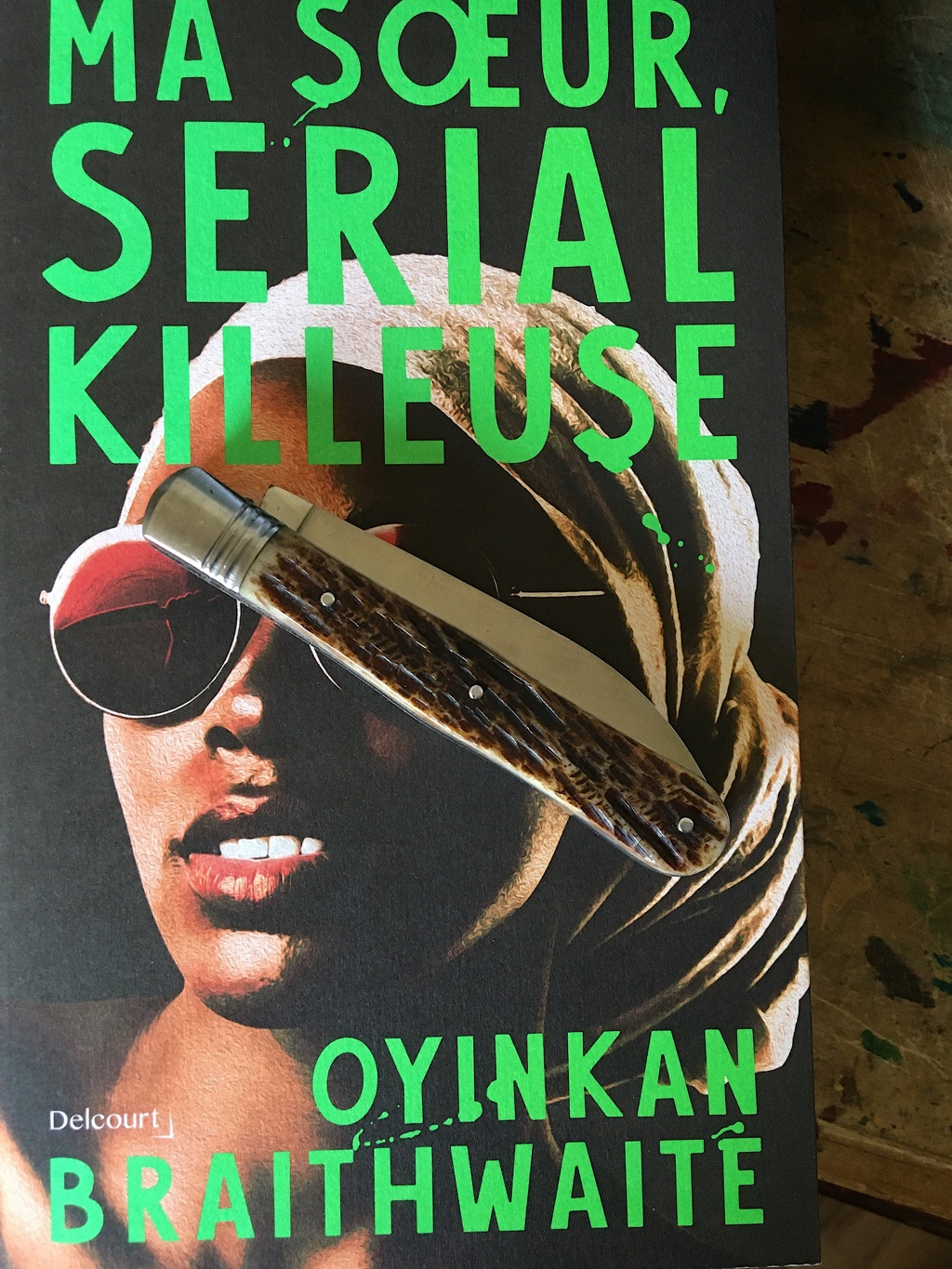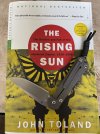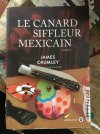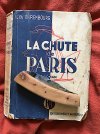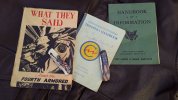-
The BladeForums.com 2024 Traditional Knife is ready to order! See this thread for details: https://www.bladeforums.com/threads/bladeforums-2024-traditional-knife.2003187/
Price is$300$250 ea (shipped within CONUS). If you live outside the US, I will contact you after your order for extra shipping charges.
Order here: https://www.bladeforums.com/help/2024-traditional/ - Order as many as you like, we have plenty.
You are using an out of date browser. It may not display this or other websites correctly.
You should upgrade or use an alternative browser.
You should upgrade or use an alternative browser.
Blades upon Books - Traditionals
- Thread starter WhittlinAway
- Start date
5K Qs
Gold Member
- Joined
- Jul 20, 2014
- Messages
- 15,143
Here's a book I read sometime during the spring; quite sure I started it when we were in St. Paul MN for our daughter's wedding on May 3.
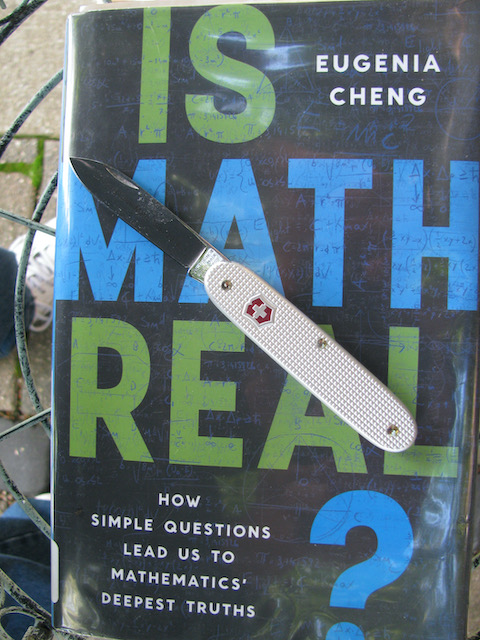
The author is a research mathematician, but she wrote the book to answer questions about mathematics that she often hears from students and other "lay persons". I thought her organization of the book was quite interesting: each chapter addresses some feature of mathematics, starting with a specific question that often perplexes people with only a casual interest in mathematics and little experience in math beyond what they studied in school. Here are her chapter titles and the initial question whose answer kicks off the discussion of that topic.
Ch. 1 Where Math Comes From
Why does 1+1 = 2 ?
Ch. 2 How Math Works
Why does – (-1) = 1 ?
Ch. 3 Why We Do Math
Why isn't 1 a prime number?
Ch. 4 What Makes Math Good
Why does 0.99999... = 1 ?
Ch. 5 Letters
Why does y = mx + b ?
Ch. 6 Formulas
Where do all those trigonometric formulas come from, and why do we have to memorize them?
Ch. 7 Pictures
Why does 2+4 = 4+2 ?
Ch. 8 Stories
How many corners does a star have?
How many sides does a circle have?
How many holes does a straw have?
I thought the author was usually quite articulate and did a good job of clearly explaining her mathematical messages.
However, she seemed compelled to occasionally discuss the historical relationships between mathematics and society, and I thought those discussions were much less clear and convincing. For example, several times she criticized mathematics (which she admires as being based on logic and rigor) for being developed and dominated by white males. Here's a representative quote from one of these discussions.
Now, at the same time as all this, it is true that mathematics as a field has grown carefully and rigorously according to a carefully constructed framework of logic and rigor. It is, arguably, the framework that is keeping some math in and some math out. But even aside from the huge question of inequitable access to resources and education, these are questions about the values built into the framework of mathematics. That framework is geared toward the principles of "progress" and "development". Deep down, I have an uncomfortable suspicion that those principles are indelibly linked to colonialism, imperialism, and the urge to conquer others.
(I suspect she would not be too happy with me if I told her that a couple of my favorite pocketknife brands were Colonial and Imperial! )
)
I guess she wishes mathematics were more inclusive culturally, and that something like Peruvian quipu knots for numeration could somehow be included in "mainstream" mathematics. But the framework DOES decide what can be considered mathematics, and so quipu is just an interesting historical/cultural artifact. (While I ate breakfast this morning, the Wimbledon tennis tournament was on TV. I know a lot of people that have taken up pickle ball for recreation over the past several years, and my understanding is that it is quite like tennis in some respects, but should Wimbledon be forced to accept pickle ball players on center court as part of the annual tournament?)
Anyway, I always find these books written by mathematicians for "the masses" to be interesting and often thought-provoking.
- GT

The author is a research mathematician, but she wrote the book to answer questions about mathematics that she often hears from students and other "lay persons". I thought her organization of the book was quite interesting: each chapter addresses some feature of mathematics, starting with a specific question that often perplexes people with only a casual interest in mathematics and little experience in math beyond what they studied in school. Here are her chapter titles and the initial question whose answer kicks off the discussion of that topic.
Ch. 1 Where Math Comes From
Why does 1+1 = 2 ?
Ch. 2 How Math Works
Why does – (-1) = 1 ?
Ch. 3 Why We Do Math
Why isn't 1 a prime number?
Ch. 4 What Makes Math Good
Why does 0.99999... = 1 ?
Ch. 5 Letters
Why does y = mx + b ?
Ch. 6 Formulas
Where do all those trigonometric formulas come from, and why do we have to memorize them?
Ch. 7 Pictures
Why does 2+4 = 4+2 ?
Ch. 8 Stories
How many corners does a star have?
How many sides does a circle have?
How many holes does a straw have?
I thought the author was usually quite articulate and did a good job of clearly explaining her mathematical messages.
However, she seemed compelled to occasionally discuss the historical relationships between mathematics and society, and I thought those discussions were much less clear and convincing. For example, several times she criticized mathematics (which she admires as being based on logic and rigor) for being developed and dominated by white males. Here's a representative quote from one of these discussions.
Now, at the same time as all this, it is true that mathematics as a field has grown carefully and rigorously according to a carefully constructed framework of logic and rigor. It is, arguably, the framework that is keeping some math in and some math out. But even aside from the huge question of inequitable access to resources and education, these are questions about the values built into the framework of mathematics. That framework is geared toward the principles of "progress" and "development". Deep down, I have an uncomfortable suspicion that those principles are indelibly linked to colonialism, imperialism, and the urge to conquer others.
(I suspect she would not be too happy with me if I told her that a couple of my favorite pocketknife brands were Colonial and Imperial!
I guess she wishes mathematics were more inclusive culturally, and that something like Peruvian quipu knots for numeration could somehow be included in "mainstream" mathematics. But the framework DOES decide what can be considered mathematics, and so quipu is just an interesting historical/cultural artifact. (While I ate breakfast this morning, the Wimbledon tennis tournament was on TV. I know a lot of people that have taken up pickle ball for recreation over the past several years, and my understanding is that it is quite like tennis in some respects, but should Wimbledon be forced to accept pickle ball players on center court as part of the annual tournament?)
Anyway, I always find these books written by mathematicians for "the masses" to be interesting and often thought-provoking.
- GT
Will Power
Gold Member
- Joined
- Jan 18, 2007
- Messages
- 33,184
mbkr
Gold Member
- Joined
- May 20, 2018
- Messages
- 8,363
One of my all time favorite comics and one of my favorite authors
You do have good taste, Jose
5K Qs
Gold Member
- Joined
- Jul 20, 2014
- Messages
- 15,143
One of my current "reading projects" is to re-read all of Steve Hamilton's mysteries featuring the character Alex McKnight, who rents out cabins in Paradise, Michigan near Lake Superior in Michigan's Upper Peninsula. Alex keeps stumbling into situations originally involving other people's troubles, and Alex usually gets in way over his head before the situation is resolved. (Alex and all the dead bodies showing up in the tiny village of Paradise reminds me of the old Murder She Wrote mysteries on TV, where Jessica Fletcher just kept getting involved with murder mysteries in her tiny town of Cabot Cove Maine.)
One of the reasons I like the series is that, being an almost life-long Michigan resident who vacations in the Upper Peninsula for a week or two each August over the past 30+ years, I have some familiarity with the locations in which events in the novels take place, and I get a kick out of that "I've been there!" feeling. For example, in the last Hamilton book I posted here, The Hunting Wind, Alex's old minor league baseball teammate comes to visit Alex and wants his help in trying to locate a woman with whom the teammate had a brief romance on his only call-up to pitch for the Detroit Tigers. Eventually, he apparently decides to give up and go back home to California. But then Alex learns that the guy ended up in a hospital in Grand Rapids MI (where I live) because of a serious shotgun wound that left him in a coma. Hamilton gets all the details right about the name and location of the hospital and its neighborhood (at least back when the book was written), and roads McKnight has to travel to get from Paradise to Grand Rapids.
The next book in the series is titled North of Nowhere, and one of Alex's friends talks him into serving as a sub at a regular poker night at the house of a rich kitchen appliance salesman in Sault Ste. Marie, the closest (about 60 mi) "big city" to Paradise. Unfortunately for all the poker players, masked and armed robbers invade the premises, take the poker cash, trash the host's house, and force him to open his safe to get what's apparently quite a lot of additional cash. I've driven from The Soo to Paradise and back numerous times on both routes described in the book - pleasing verisimilitude! Alex tries to find out who did the break-in and robbery, but numerous complications ensue, including evidence planted to implicate some of the poker players as being involved, connections to organized crime in Canada, just across the St. Mary's River, and international smuggling by the rich host.
Another geographic detail that I appreciated when I re-read the book was that the appliance dealer was working on some kind of real estate deal in which he would turn coastal property near The Soo into an elite, exclusive haven for the very wealthy, similar to Bay Harbor MI, near Petoskey. The first time I read the novel, I really had no concept of the implications of this. But a couple of summers ago, one of my nieces had a "destination wedding" in Bay Harbor, so now I have a much more accurate idea of the ostentatious lifestyle being addressed in the book.
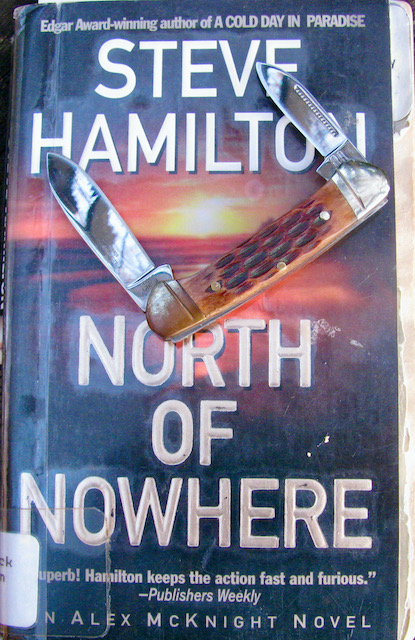
- GT
One of the reasons I like the series is that, being an almost life-long Michigan resident who vacations in the Upper Peninsula for a week or two each August over the past 30+ years, I have some familiarity with the locations in which events in the novels take place, and I get a kick out of that "I've been there!" feeling. For example, in the last Hamilton book I posted here, The Hunting Wind, Alex's old minor league baseball teammate comes to visit Alex and wants his help in trying to locate a woman with whom the teammate had a brief romance on his only call-up to pitch for the Detroit Tigers. Eventually, he apparently decides to give up and go back home to California. But then Alex learns that the guy ended up in a hospital in Grand Rapids MI (where I live) because of a serious shotgun wound that left him in a coma. Hamilton gets all the details right about the name and location of the hospital and its neighborhood (at least back when the book was written), and roads McKnight has to travel to get from Paradise to Grand Rapids.
The next book in the series is titled North of Nowhere, and one of Alex's friends talks him into serving as a sub at a regular poker night at the house of a rich kitchen appliance salesman in Sault Ste. Marie, the closest (about 60 mi) "big city" to Paradise. Unfortunately for all the poker players, masked and armed robbers invade the premises, take the poker cash, trash the host's house, and force him to open his safe to get what's apparently quite a lot of additional cash. I've driven from The Soo to Paradise and back numerous times on both routes described in the book - pleasing verisimilitude! Alex tries to find out who did the break-in and robbery, but numerous complications ensue, including evidence planted to implicate some of the poker players as being involved, connections to organized crime in Canada, just across the St. Mary's River, and international smuggling by the rich host.
Another geographic detail that I appreciated when I re-read the book was that the appliance dealer was working on some kind of real estate deal in which he would turn coastal property near The Soo into an elite, exclusive haven for the very wealthy, similar to Bay Harbor MI, near Petoskey. The first time I read the novel, I really had no concept of the implications of this. But a couple of summers ago, one of my nieces had a "destination wedding" in Bay Harbor, so now I have a much more accurate idea of the ostentatious lifestyle being addressed in the book.

- GT
5K Qs
Gold Member
- Joined
- Jul 20, 2014
- Messages
- 15,143
Mike, I saw this book while browsing in the local branch of the public library, and checked it out for my wife. She has read most of Child's Reacher books and she likes watching Will Trent episodes on some streaming service. She thought it was good! I didn't read it, since I know nothing about Will Trent, but I did tell her that you were a fan of Karen Slaughter. Maybe she'll start reading some of her books.
- GT
mbkr
Gold Member
- Joined
- May 20, 2018
- Messages
- 8,363
Slaughter has several stand alone novels, but the Grant County series and Will Trent series are best read in order. The Grant County series is what made me a fan. The first Will Trent novel, Triptych, stands out to me. I read it long enough ago that I don't remember the details, but I remember that, not once, but twice, I thought I knew where the plot was going when it took a surprising turn. I need to read it again and see if it still holds up. Edit: forgot to mention that I also enjoy the Will Trent TV series, but there are a lot of differences between the TV show and the books. The character of Angie, in particular, has been redeemed for TV.Mike, I saw this book while browsing in the local branch of the public library, and checked it out for my wife. She has read most of Child's Reacher books and she likes watching Will Trent episodes on some streaming service. She thought it was good! I didn't read it, since I know nothing about Will Trent, but I did tell her that you were a fan of Karen Slaughter. Maybe she'll start reading some of her books.
- GT
I'm also in the process of reading all the Alex McKnight novels. I have the two on deck: Die a Stranger and Dead Man Running. I thought these were the last two I had not read, but just found out there is another one: Riddle Island. I think of him as Rockford: well meaning and always getting in trouble. Sometimes not of his own making. BTW, I'm pretty sure Jessica Fletcher was a serial killer
5K Qs
Gold Member
- Joined
- Jul 20, 2014
- Messages
- 15,143
Thanks for the Slaughter info, Mike. I'll show it to my wife. I think she'd appreciate your comments, since you have more experience with Slaughter than she does.Slaughter has several stand alone novels, but the Grant County series and Will Trent series are best read in order. The Grant County series is what made me a fan. The first Will Trent novel, Triptych, stands out to me. I read it long enough ago that I don't remember the details, but I remember that, not once, but twice, I thought I knew where the plot was going when it took a surprising turn. I need to read it again and see if it still holds up. Edit: forgot to mention that I also enjoy the Will Trent TV series, but there are a lot of differences between the TV show and the books. The character of Angie, in particular, has been redeemed for TV.
I'm also in the process of reading all the Alex McKnight novels. I have the two on deck: Die a Stranger and Dead Man Running. I thought these were the last two I had not read, but just found out there is another one: Riddle Island. I think of him as Rockford: well meaning and always getting in trouble. Sometimes not of his own making. BTW, I'm pretty sure Jessica Fletcher was a serial killer
My postings about the McKnight novels I've been reading lag far behind my actual reading of the books. I recently finished Die a Stranger and have Let It Burn on hold at the library. I've never read either of the 2 most recent McKnight novels, Dead Man Running and Riddle Island, so I won't actually be RE-reading for the final 2 books of my Alex McKnight project. (My wife hasn't read either of the 2 most recent ones either, and she's the one that got me started on reading them.)
I can see why Alex reminds you of Rockford. His "romantic entanglements" remind me of the Cartwright brothers on Bonanza. Kissing Alex or the Cartwrights is usually the "kiss of death" for the women involved.
Your conjecture about Jessica Fletcher certainly has merit!

- GT
Pt-Luso
Basic Member
- Joined
- Nov 8, 2014
- Messages
- 19,715
One of my all time favorite comics and one of my favorite authors
You do have good taste, Jose
Many thanks, Mike.
Hickory n steel
Gold Member
- Joined
- Feb 11, 2016
- Messages
- 20,080
Will Power
Gold Member
- Joined
- Jan 18, 2007
- Messages
- 33,184




